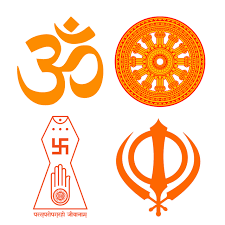
The Indian spiritual system is a diverse and complex set of beliefs, practices, and philosophies that have evolved over thousands of years in the Indian subcontinent.
1. **Hinduism:** Hinduism is one of the world’s oldest religions and is deeply rooted in Indian spirituality. It encompasses a vast array of beliefs, rituals, and practices, with a focus on concepts such as karma (the law of cause and effect), dharma (duty or righteous living), and moksha (liberation from the cycle of reincarnation).
2. **Yoga:** Yoga is a system of physical, mental, and spiritual practices that originated in India.It includes various paths such as hatha yoga (postures), bhakti yoga (devotion), jnana yoga (knowledge and wisdom), and karma yoga (selfless action), and is often seen as a means of attaining spiritual enlightenment and self-realisation.
3. **Buddhism:** Although Buddhism originated in India, it has spread to many other parts of the world. The teachings of Siddhartha Gautama, known as the Buddha, emphasize the Four Noble Truths and the Eightfold Path as a guide to achieving enlightenment and liberation from suffering.
4. **Jainism:** Jainism is an ancient Indian religion that emphasizes non-violence (ahimsa), truth (satya), non-possessiveness (aparigraha), and asceticism. Jains seek spiritual purity and liberation from the cycle of birth and death through rigorous ethical and ascetic practices.
5. **Sikhism:** Sikhism emerged in the Punjab region of India in the 15th century. It emphasizes devotion to one God, equality of all humans, and living a life of honest labor and service.
6. **Tantra:** Tantra is a diverse set of practices and beliefs that can be found within Hinduism and Buddhism. It often involves the use of rituals, mantras, and meditation to achieve spiritual growth and transformation.
7. **Advaita Vedanta:** This is a non-dualistic school of philosophy within Hinduism. It teaches that the ultimate reality (Brahman) is unchanging and that individual souls (Atman) are ultimately identical to Brahman. The path to realization in Advaita Vedanta involves self-inquiry and meditation.
8. **Mysticism:** India has a rich tradition of mysticism, with numerous saints, sages, and mystics who have claimed direct experiences of the divine. These mystics often emphasize personal experience and direct communion with the divine.
9. **Ayurveda:**Ayurveda is an ancient system of medicine, which is closely connected with spirituality. It focuses on balancing the body, mind, and spirit through natural remedies, diet, and lifestyle practices.
10. **Vedas and Upanishads:** These are ancient sacred texts that form the foundation of many spiritual and philosophical traditions in India. The Upanishads, in particular, delve into profound philosophical and metaphysical concepts.
It’s important to note that within each of these traditions, there are numerous sects, schools of thought, and regional variations. Indian spirituality is characterized by its diversity and has profoundly influenced the culture, art and philosophy of the Indian subcontinent and beyond.